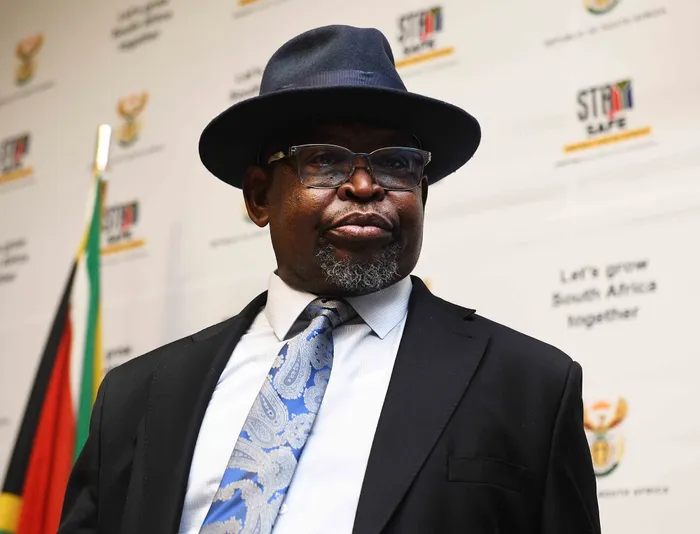Enoch Godongwana preps for third budget presentation, without VAT hike
BUDGET

Finance Minister Enoch Godongwana.
Image: Independent Newspapers
South African Finance Minister, Enoch Godongwana, will be hoping that third time's a charm this coming week as he is set to deliver his Budget Speech once again, this time, without the Value Added Tax (VAT) increase.
Parliament will gather and South Africans will tune in for a third time this month in relation to the country's Budget that will be tabled on Wednesday this week, after the Minister's first attempt was thwarted as he included a hefty 2% VAT increase hike.
Godongwana then presented his March 2025 Budget, where the VAT increase was dialled down to 1%, with 0.5% coming into effect this year and the other half in 2026.
The decision was once again met with much discontent from the public and opposition political parties, with the Democratic Alliance (DA), joined by the Economic Freedom Fighters (EFF), taking the matter to court, despite the budget being passed.
Earlier this month, Treasury announced the reversal of the VAT increase and announced that Godongwana will hold a new Budget this coming week.
Godongwana said that the Budget of 12 March 2025 and the proposed VAT increase sparked rigorous debate.
“This is welcomed in a healthy democracy. Today there is clarity that VAT will remain at 15%. This decision was shaped not only by political debate but by the voices of the South African people. When people speak we must listen. I'm encouraged by the passion shown, and it reflects the seriousness with which we approach the hard choices needed to place our finances on a sustainable path.”
What can we expect to hear in this week's Budget
Godongwana said that the National Treasury has already commenced work on developing a new fiscal framework that will maintain their trajectory toward debt stabilisation, a crucial element in strengthening our public finances.
“The revised budget will adhere to all established technical processes and consultations as set out in the Money Bills and Related Matters Act. This includes formal consultations with the Financial and Fiscal Commission, thorough consultations with all political parties within the Government of National Unity, as well as Cabinet approval before presentation to Parliament.”
Lead economist at KPMG, Frank Blackmore, told Business Report that the comprehensive review will include the fiscal framework, appropriations bill, division of revenue bill, as well as the already tabled rates and monetary amounts and amendment of revenue laws bills.
Blackmore said, "Public services should continue to be rolled out. The Minister also informed us that the National Treasury has begun developing the new fiscal framework to maintain the trajectory towards debt stabilisation, an essential element in strengthening public finances. A key point here is that the Treasury will need to revisit the economic assumptions, using the most recent data available," Blackmore said.
"I imagine their GDP forecast will be revised down from the 1.9% we saw in the previously tabled budget. This process involves generating updated fiscal projections, recalculating revenue estimates, determining appropriate borrowing strategies, and consolidating these elements into a coherent fiscal framework. It seems that much remains open at this stage, and we will only see the full details on 21 May, by which time, one hopes, agreement will have been reached with all parties that form part of the Government of National Unity (GNU)," Blackmore added.
Meanwhile, Bakgatla leader Kgosi Nyalala Pilane said that the third Budget should prioritise rural development and economic inclusion.
Kgosi Pilane said it was vital that the national budget goes beyond macroeconomic targets to focus on foundational infrastructure that enables local economies to grow.
“Government must understand that infrastructure is the cornerstone of economic development. No investor will consider establishing operations in a community without roads, electricity or water. The continued failure to address these basic needs perpetuates poverty and undermines national growth.”
Kgosi Pilane added that cutting waste and curbing corruption should take precedence over introducing additional taxes that further burden citizens.
“It is not always a question of insufficient funds, but rather how those funds are managed. Fiscal discipline, transparency, and accountability must become non-negotiable in every department.”
He also raised concern over the size of government and inefficiencies in public spending.
“We cannot continue to justify the cost of an inflated executive. Almost every minister is supported by one or two deputy ministers, yet rural areas remain without roads, schools or clinics. The financial resources consumed by these positions could be far better spent on direct service delivery where it is most needed.”
With the country facing a significant budget deficit, Kgosi Pilane urged the Minister to prioritise spending that delivers real impact and avoid shortcuts that harm low-income households.
“A VAT increase or fuel levy adjustment may appear expedient, but the cost will be borne most heavily by the poor. That is not the kind of recovery South Africa needs.”
Visit: www.businessreport.co.za
BUSINESS REPORT